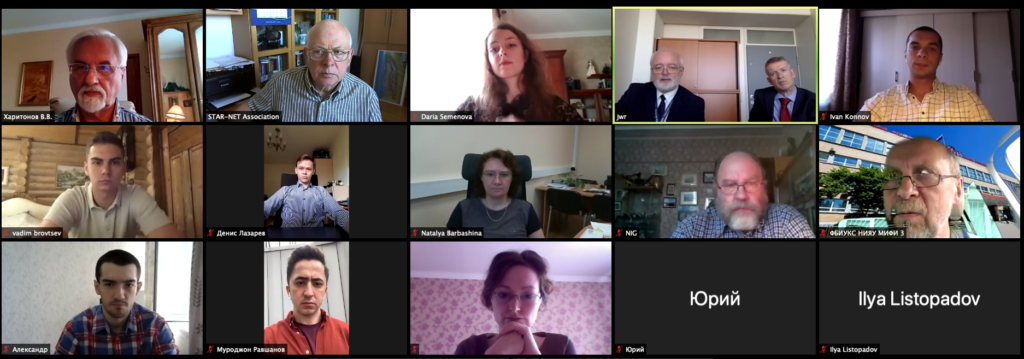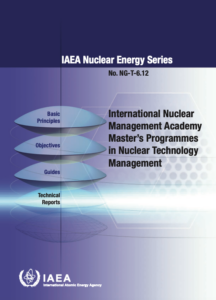 The IAEA’s collaboration with the world’s leading universities has led to the creation of the IAEA International Nuclear Management Academy (INMA), where universities provide master’s degree programmes in accordance with the IAEA requirements focused on aspects of nuclear sector management with an emphasis on modern aspects of management in the field of nuclear technology, science and technology. The INMA promotes cooperation between universities in the development of joint educational programmes, mutual use of educational resources and tools. The INMA is aimed at executives and future managers working in the nuclear power sector. The INMA is supported as a programme activity of the Nuclear Knowledge Management Section of the IAEA Department of Nuclear Energy.
The IAEA’s collaboration with the world’s leading universities has led to the creation of the IAEA International Nuclear Management Academy (INMA), where universities provide master’s degree programmes in accordance with the IAEA requirements focused on aspects of nuclear sector management with an emphasis on modern aspects of management in the field of nuclear technology, science and technology. The INMA promotes cooperation between universities in the development of joint educational programmes, mutual use of educational resources and tools. The INMA is aimed at executives and future managers working in the nuclear power sector. The INMA is supported as a programme activity of the Nuclear Knowledge Management Section of the IAEA Department of Nuclear Energy.
The INMA master’s programme in Nuclear Technology Management (INMA-NTM) is designed to generate a broad understanding of the life cycle of nuclear technologies and best management practices in the nuclear context. Specific management knowledge, such as nuclear safety, security and safeguards, the global nuclear outlook, engineering economics, public relations, and ethical issues, aims to prepare graduates for management level analysis and decision making.
To date, the INMA-NTM programmes of seven universities: The University of Manchester, United Kingdom; National Research Nuclear University MEPhi, Moscow, Russia; University of Tokyo, Japan; Texas A&M University, United States of America; North-West University and University of the Witwatersrand, South Africa; and Budapest University of Technology and Economics, Hungary have been endorsed by the IAEA as their INMA-NTM programmes meet all INMA requirements.
Eight more universities from Armenia, Belarus, Kazakhstan, Canada, China, the United States and the Czech Republic, including three member universities of the STAR–NET network, consider the development of the INMA-NTM programmes or plan to submit their programmes for assessment in the near future.
On July 30, 2020, an online ceremony was held for awarding certificates of the International Nuclear Management Academy to graduates of the National Research Nuclear University MEPhI Master’s programme on “Nuclear Technology Management”. This is the third generation of the INMA-NTM masters.
The advantage and specificity of the educational process in the INMA-NTM master’s programme is its interdisciplinary nature, including the study of modern and promising nuclear technologies, international scientific and technological cooperation, the latest tools for financial and economic analysis, strategic planning and management of innovative development, taking into account the specifics of the nuclear industry. A number of courses are taught in English.
The INMA-NTM programme at NRNU MEPhI is implemented by the Faculty of “Business informatics and complex systems management” and the “Institute of nuclear physics and engineering”. Technological disciplines in the educational programme are supervised by the Department No. 5 “Theoretical and experimental physics of nuclear reactors”. Economics and management disciplines are supervised by the Department No. 72 “Business project Management”, which is appointed by the graduating department for this programme. Experts and staff of the IAEA also participated in the training of students.
The ceremony of awarding IAEA certificates to graduates of the NTM master’s programme was held for the third time and there is every reason to believe that it will firmly enter the tradition of NRNU MEPhI, which will continue to train highly qualified management personnel for the domestic and global nuclear industry.
 The IAEA recently published a document «International Nuclear Management Academy Master’s Programmes in Nuclear Technology Management, Nuclear Energy Series No. NG-T-6.12, IAEA, Vienna, 2020», which provides guidance for these master’s programmes that have a specialized focus on the advanced aspects of management and leadership required by the nuclear sector. It describes the requirements for an INMA nuclear technology management programme (NTM) as well as recommendations for their implementation.
The IAEA recently published a document «International Nuclear Management Academy Master’s Programmes in Nuclear Technology Management, Nuclear Energy Series No. NG-T-6.12, IAEA, Vienna, 2020», which provides guidance for these master’s programmes that have a specialized focus on the advanced aspects of management and leadership required by the nuclear sector. It describes the requirements for an INMA nuclear technology management programme (NTM) as well as recommendations for their implementation.